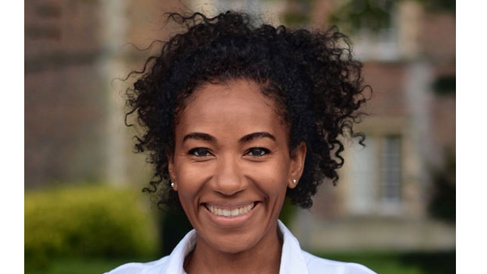
Njemile Faustin, former PhD student of Professor Lord Robert Mair, Head of CSIC, has been elected to the Institution of Civil Engineers (ICE) Council and starts her term of office this month.
Currently a Senior Geotechnical Engineer in the Ground, Energy & Transaction Solutions division at AECOM, Njemile works on a range of projects that involve the design of infrastructure. “Recently, I worked on the earthwork structures for the new High Speed 2 railway and now I am working on National Grid’s electricity infrastructure upgrade project in London,” said Njemile, who hadn’t always planned to be an engineer.
My CSIC colleagues were carrying out trailblazing innovative research to use technology to improve the resilience of our ageing infrastructure and increase the capacity and efficiency of new infrastructure and construction processes. Ultimately, this has considerable societal benefits and aligns with the United Nations Sustainable Development Goals. It was exciting to be part of such a group. Njemile Faustin, Senior Geotechnical Engineer AECOM
During her time as a PhD student supervised by Professor Mair, Njemile remembers how useful field experience was to her learning. “I investigated the performance of circular shafts – a key aspect of most underground tunnel schemes – using the geotechnical centrifuge at Cambridge University. Field observations of actual shaft performance were crucial to validate the experimental results, so I worked closely with CSIC staff and students to instrument several shafts for London’s new Elizabeth Line (previously called Crossrail) and the Thames Water Abbey Mills shaft, with the innovative fibre optic sensing system.”
Learning how to apply smart solutions to address grand challenges provided Njemile with insights and experiences that have helped shape her career. “The collaborative, inclusive and highly stimulating environment at CSIC has been formative. The academics at CSIC are world-leading experts in their respective fields and generously share their knowledge. As a student, I found this support inspiring and motivating. My CSIC colleagues were carrying out trailblazing innovative research to use technology to improve the resilience of our ageing infrastructure and increase the capacity and efficiency of new infrastructure and construction processes. Ultimately, this has considerable societal benefits and aligns with the United Nations Sustainable Development Goals. It was exciting to be part of such a group”.
“Being a part of CSIC has helped my career tremendously. In addition to having a network of colleagues from all around the world, having knowledge of some of the new technologies and innovations for infrastructure and construction has been hugely beneficial in my job at AECOM.”
Njemile believes engineers have an important role to play in today’s world. “There are some big humanitarian challenges to be addressed. Mitigating against climate change is high on the agenda. Engineers are uniquely positioned to tackle these challenges and I am motivated knowing how privileged I am to be in a position to improve the day-to-day quality of life for everyone in society. I definitely do not want to waste this opportunity.”
Taking her seat as part of the ICE Council, which has 38 members who serve for three years and are tasked with representing the views of members to the Trustee Board and debating issues relevant to civil engineering, the Institution and society, Njemile is looking forward to her first Council meeting next month. “I am hoping to broaden my knowledge and experience and to really contribute to the debates. When I was informed that I was elected to Council I felt excited and deeply grateful that ICE members worldwide, and my sponsors, trusted me to serve them and to support the Institution of Civil Engineers in its drive for a better society.”
